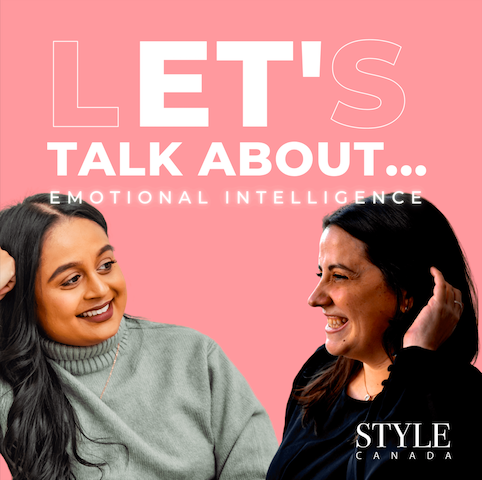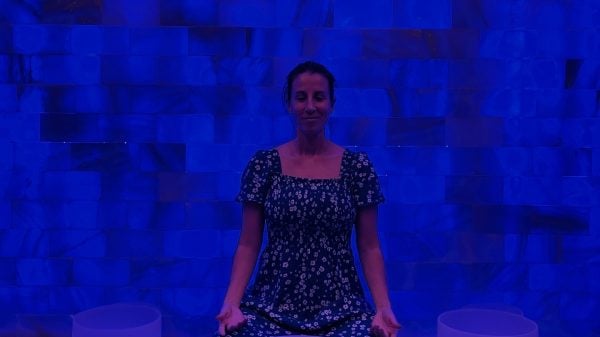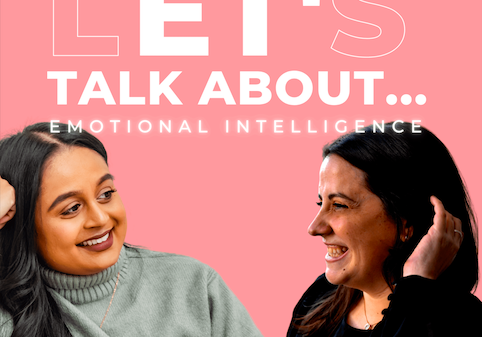On this week’s episode of Let’s Talk About…, Elise sits down with co-host Sarah Joseph to talk about intuition.
Sarah is a certified emotional intelligence coach whose mission is to help you get comfortable with your emotions and master them to live a more purposeful life. She understands how our lack of emotional management can impact the longevity of our relationships and can inspire our emotional healing by plugging into our most powerful tool, the Mind. Her philosophy is that our emotions show up in every aspect of our lives and it’s your right to learn how to manage them effectively to your advantage.
On this week’s episode, Elise and Sarah talk about what is Intuition, the reasons why some don’t trust intuition, intuitive vs intrusive thoughts, and how to trust your intuition.
“…Intrusive thoughts scare you right away, they make you feel fearful right away. An intuitive thought comes up very confident and it’s like, you know that that is the truth.” Sarah tells Elise on Let’s Talk About.
Check out of show’s full transcript.
[00:00:00] Elise: Hi everyone, and welcome. This week let’s talk all about emotional intelligence and specifically our intuition with emotional intelligence coach Sarah Joseph.
Hi Sarah. Hello. How are you today? I’m good. How are you?
[00:00:13] Sarah: I’m doing good and super excited for this topic. Yeah, I’ve been waiting for it entire season. We
[00:00:20] Elise: did last year, I guess it was probably last summer. Almost a year ago, cause we’re into spring now. We did a topic on intuition with psychic median Lynn Nichols, which was really interesting.
And I think I’m excited to talk about it with you because I think you’ll bring a different lens to it. Um, and so I, and I do also feel like, I don’t know if everyone else listening feels like this, but I feel like with the change of seasons, it’s like a good time to kind of tap into your intuition because there’s also changes coming like.
You’ve had some, you know, just moving spaces. We’re opening up a new store and, and renting a space. There’s like lots of things changing I think for both, even just what we’ve shared personally with each other, for both of us, and I’m sure a lot of other people, as spring comes, there’s that sense of newness and so yeah, I think intuition is like a good thing to tap into right now.
[00:01:14] Sarah: It sounds like a lot of decisions are being made and Right. Intuition is so tied into decision making and it’s, it’s, it, this is gonna be a great topic. I’m excited. Okay. Cool. Well,
[00:01:24] Elise: why don’t we start with what is intuition? I mean, maybe I’ll say what I think it is to me and then you can give a more like scientific-technical Oh, sure.
Uh, note to it. So, I guess for me it’s like that gut instinct. Mm-hmm. I think what I would like to chat a little bit about later saying get your take on, is sometimes I think our fears can get in the way of that gut instinct and so maybe how you suggest or how we both kind of try to like separate that.
Right? Like cuz I, oh sure. I think. That can come up and I, and I’ll give an example later for me. So that’s, but that’s what it is to me. I guess it’s like what your, just like initial reaction. If someone says, do you wanna go, you know, to New York tomorrow, what’s your, like, initial, that’s not a great example of like a life changing thing, but like Right.
What’s your initial gut reaction to it? Um, so that without overthinking, that’s what I think what I would say intuition is. But I’m sure you have a much more robust definition
[00:02:25] Sarah: and we can totally get into that because I actually get into that a little later about how we differentiate the two, so, okay. No, I love that you brought that up.
So, getting into what. Intuition is, um, I, so I, as I was doing the research for this, I was like, you know, there’s so many thoughts going through my head at the same time, and I was like, what is intuition to me? But what do other people think intuition is? So I wanted to go on the Googles, of course, and I looked up a definition of what it is, of what other people think it is, and uh, Google says it’s the ability to understand something immediately without the need for conscious reasoning.
And then something similar underneath that is when you know something based on an instinctual feeling rather than a conscious reason. Okay, so that kind of leads it to classifying it as you sometimes hear it as it’s a gut feeling, right? Or it’s a hunch, or it’s an inner knowing, or it’s a wisdom or an inner wisdom, or it’s a.
It’s, I just knew, you know, or I don’t know why. I just felt like, right. Mm-hmm. You kinda hear it that way. So I typically tend to see intuition as this tool that was kind of created and designed in the human body to be this. Survival mechanism similar to our, uh, fight or flight responses. So our fight or flight responses are technically to protect us, right?
Mm-hmm. So to keep us safe and out of danger in order to maintain our survival. And that’s exactly what intuition is as well, right? So in this case, our intuition comes up as another mechanism designed in our body to keep us safe from potential threats. So it’s an instinctual thing that kind of happens in our.
And then I was like, well, what is an instinct? Right? Well, what is that like? We all say it, but what does it actually mean? And Britannica Dictionary actually has a really good definition that, that I loved and I went, that’s what an instinct is. People will totally understand that one. But an instinct is, A way of behaving, thinking or feeling that is not learned.
Right. Right. So it’s a natural desire or tendency to make you want to act in a particular way. Right. So intuition is heavily linked to your instincts, which is you behaving thinking or feeling in a specific way that’s not learned.
[00:04:49] Elise: Okay. So if our instincts are a part of our intuition that aren’t learned, are we just like born with it? Because I feel like so much of our behavior is probably learned, right? Like so is that just, is, were you just saying instincts?
Is that like what you, I guess kind of what you said, like that fight or flight, like built into. Our like functioning body or like mechanism in our body?
[00:05:16] Sarah: Pretty much. Yeah. And if of course, if it’s not being used over time. Mm-hmm. Right. What’s gonna happen is you’re gonna lose access to it. It’ll still be there, but you might not be able to use it as much as someone who is actively using it.
Okay. Right. Or is actively engaging with this specific intuitive feeling. Ok. So over time you can lose access to it. But you can regain access if you, you know, do some things to help clear that up. But intuitively, yes, you are born with intuition. We do have it as a mechanism internally in our bodies.
Right? And there’s so much behind it that I can’t wait to explain it, but it’s essentially where. The body is always kind of communicating with us. It’s communicating through to you through feelings, through sound, through just any type of communication, whether or not you are aware of it or not. So it’s conscious or unconscious communication.
[00:06:07] Elise: And, and I guess too, you could not be in tune with your intuition, right? Like it could be doing, sending those signals, but you could just be so like busy with day to day or like absorbed in other things that you’re not like tapping into.
[00:06:23] Sarah: Exactly. Exactly. So you’re just kinda out of touch with it. You’re not as connected to it.
Right. And with kind of this day and age, we seem to be really not connected to our intuition as we used, used to be. Right. Um, but if you actively make the effort to connect with those feelings and understanding what that is, you’ll a hundred percent start to feel it working for you in your everyday life.
And going back to how. You know, our intuition communicates to us, like the body is always communicating to us. So for example, when you are feeling hungry, right? You’re usually not aware when your stomach is empty until your stomach growls at you, or you maybe feel a rumbling or your stomach feels upset, and that’s an indication that your body is saying, Hey, I need food.
Why? In order to maintain survival so you can keep surviving. Maybe you’re tired , what indicates to you that you’re tired is you yawn, right? And it indicates that your body is shutting down. You need to go to rest. You need to recharge and go back to bed. So intuition works the same way, but the way intuition works is through energetic communication.
So everything gives off energy, everything gives off vibration, and your intuition is what detects that. That mechanism in your body detects that. Physical energy and vibration coming off of any, anything that you’re, you know, doing. People, places, things. And we have these senses or extra receptors in our body that help to detect those vibrations and energy right away.
And when we are detecting it, it will determine whether or not it’s maintaining our survival, whether or not it’s something we need to intuitively know to help maintain our survival from this psychological level. So instead of fight, flight, or freeze, you are getting this intuitive inner wisdom, inner knowledge to not go there, not to talk to that person, not to trust that thing or you know, you just knew that they were lying, for example, right? So what it essentially does is keep you safe or this is safe and this is not safe. So there’s kind of two signs of that coin.
[00:08:22] Elise: Okay. And now we’ve talked about intuition in terms of like that, like you just said, safe, not safe.
Mm-hmm. Um, what are some other intuition or other situations, I guess, where intuition can come up? Because I could see it coming up, um, in business decisions, right? Mm-hmm. Where like, I don’t know if you could use the verbiage safer, unsafe necessarily for that. Maybe you could use like risky, not as risky or something.
Yes. You could see it coming up. You mentioned in relat. In terms of like, that person isn’t safe for me, but we often say like, trust your intuition when it even just comes in generally to falling in love, not having to do with safe or unsafe. Um, so is there, I guess we have prob, we’ve layered on a little bit more to intuition than just that as a society guess.
Then just that like safe. Right. Um, right. Is that fair to say?
[00:09:15] Sarah: I think that’s fair to say for sure. Yeah. And I think there’s def different layers of how each, you know, Each industry kind of uses intuition, cuz business is definitely heavily impacted by intuition, right? Mm-hmm. Uh, if you just google intuition in businesses, like there are so much there, right?
Yes. So businesses are heavily using intuition in their practices every day, right? And just in their decision making. Um, but that is one of the areas where intuitions or sit, a situation where intuition can come up. So there are people, so other people decision making, dating for example, those are all areas.
So maybe. Have you ever had someone maybe compliment you or congratulate you on something and they said it really nicely? You just felt the energy was really off, like it didn’t feel pure, or the intention didn’t feel like it was for your best interest. Right? There are times where you would just go, you know, I, it just felt off.
I don’t know, like she was saying all the right things, but it just felt off. Mm-hmm. Why? Right. Why did you have that inkling? That’s your intuition speaking to you. Right? And maybe, you know, you can feel. Something intuitively. Maybe this is that someone doesn’t like you, right? Maybe they’re saying all the right things or doing all the right things, but you could tell they just don’t like you.
Mm-hmm. In decision making. So maybe you’re driving down a major highway, right, and you’re, it’s during rush hour and you’re, you know, off to work, and then you get to work, and then you find it, and then you accidentally take, you know, maybe the wrong exit just on accident, right? Or maybe you make the decision to make another exit because something just said, you know, just, just make the right.
Let’s not make the left, and then you get to work and you find out that you, there was a massive crash on the road that you completely avoided. Mm-hmm. That was an intuitive decision, right? Something just told you to make that right instead of that left, right? Mm-hmm. Where did that come from? Right. So there’s situations like that and then there’s dating, right?
So, um, maybe whether or not you continue to see someone again after the first date or second date. I know in my like, teenage years and, you know, in the early twenties, early twenties as if I’m old, but, well, I was dating, um, I definitely had a lot of intuition with the people that I was dating, right? And. I most likely would or wouldn’t see them after that first date.
Right. Or I’d let them know that, you know, it might not be something that I’m interested in moving forward. And it was just some, A lot of the time it was an intuitive feeling. Right. Just telling me that, you know, this might not be the right thing for you, but what’s coming is Right. Right. So some of us have a lot of that.
Uh, so I guess it just depends on where your intuition lies, but it usually comes up in almost every single decision make. Right,
[00:11:58] Elise: right. And maybe we can even, like, I would imagine some of those things you mentioned, like avoiding the car accident, things like that, those are things that we cannot really actively.
Control, I don’t think or tap into. Mm-hmm. That’s, that probably is like a subconscious, is that fair to say percent versus like, when it comes to like relationships or decision making in, in business or life or where to move or things like that. That’s probably a little more something that we can kind of be introspective on.
Is that probably true? Yeah, that is true. Yeah. So, okay, so why then? Do some of us ignore our intuition in those situations? Is that fear-based?
[00:12:43] Sarah: It could be. Yeah, there are definitely many reasons why we would ignore the intuition. I guess you could say that some people see it as this wooey wooey, it’s not real kind of thing.
Right? Um, but one reason could be that they don’t know it exists, right? So a lot of people are not aware that intuition is something that is a part of their humanity, right? Or something that is a part of them specifically. They might think that they’re strange or weird or they might ignore it, right? Um, The other one that I found really interesting is that they no longer can hear it, right?
So we tend to ignore it. So, which means that they’re kind of out of tune with their feelings and their sensations happening in their body if they’re not able to trust their intuition, right? Um, and because of that, it could. Force them to want to rescind from using their, that type of intuition or even believe it or trust in it.
And if you’re not trusting in it, you won’t use it, right? You’ll tend to ignore it or say that it’s, you know, this, this thing in the back of my head, right? But that’s not really important. But that thing in the back of your head is speaking to you. It’s communicating to you. It’s telling you something that may or may not benefit yours, that most likely will, sorry, benefit your survival.
But we usually tend to ignore it, right? Mm-hmm. Because again, not in tune with the feelings and the vibration and understanding that it is something that’s there. So over time, again, if you’re not using it and you’re used to ignoring it, you’ll have limited access to it, right? So you won’t hear it as much anymore.
It won’t echo back at you as much. You won’t make those decisions, or those thoughts won’t come up immediately for you, right? Because you just don’t have access to it as someone who does use their intuition more int intellectually and on a daily basis, for example. So there, there’s a lot of reasons why.
Another reason is we might not want to accept the truth, right? Or we feel a little crazy that it’s true, right? So I know there was a lot of times where an intuitive decisions or thoughts have come up for me and I went, oh my God, I just don’t wanna believe that though, right? I just don’t want to face the truth about that though, but nine times outta 10, that truth did save me right in the future. But, um, In terms of most people, the fear of knowing the truth can sometimes be detrimental to whatever it is that’s happening in their own life. So ignoring it is probably the best way to go about it. So ignoring our intuition can be very, very detrimental if we’re not able to, you know, learn about it, know that it exists, what is it, what it feels like, how to use it to our advantage.
Because once you’re able to use your intuition to your advantage, You can, you’ll, you’ll be, you’ll be a superstar.
[00:15:24] Elise: Well, and okay, so let’s say that we believe in intuition. We don’t think it’s like a woowoo scenario. How can we pay more attention to it? Like how can we separate that fear you mentioned, or you know, from our actual instincts telling us, you know, what, what is and what isn.
[00:15:45] Sarah: Right. So I actually have a lot of clients that go through that as well, and they heavily talk about, well, I’m really in tune with my intuition. Like I’m an intuitive person, I’m a spiritual person. I’m very aligned and connected. But then I have these other thoughts that come up. And those thoughts are really fearful.
Like there’s, they’re, they’re very intrusive. So what I started teaching my clients is knowing the difference between an intuitive thought and an int. Thought. So there are two different thoughts that can come up. And knowing what they feel like and what they sound like for you will help you determine the difference between an intuitive thought and a intrusive thought.
So an intrusive thought is something that sounds very loud, right? And it’s sound as much as, as it’s loud. It makes you feel very nervous, maybe very anxious, maybe really scared, maybe really fearful, and is very repetitive, right? So it’s a thought that. Is in your subconscious as a pattern, and it creates a lot of havoc, either in your body or in your mind.
It kind of gets you to spiral. It doesn’t feel peaceful, it doesn’t feel restful. It doesn’t feel wise, but an intuitive thought feels very soft, quiet, and peaceful. Right? It actually sounds like it’s telling the truth. You know, this. It sounds very peaceful. It sounds very kind, right? It sounds very confident, right?
Like
[00:17:08] Elise: Angel in the, you know what, in comedies in the nineties, I feel like they still do it in shows, but like the angel in the devil, like the devil would be like fiery and loud and the angel would be calm and peaceful, and that’s, Like an interesting analogy. I dunno if that’s intrusive versus intuition, is that
[00:17:23] Sarah: you could really use that analogy too.
Yeah, yeah, for sure. That’s definitely what it sounds like. So intuition is this beautiful white angel and she’s telling you the truth, but then there’s, you know, the devil on the other side and he’s telling you all of these intrusive, dirty thoughts and he’s saying, you know, That’s not gonna work out, or you shouldn’t make that decision, right?
But then your intuition is usually just this wire, wiser inner knowing, higher, feeling, confident. It’s more of a light bulb, and you’re like, I just know that the thought after that, right? Usually because intrusive thoughts scare you right away, right? They make you feel fearful right away. An intuitive thought is more, at least for me, it comes up very confident and it’s like, you know that that is the truth.
But then you might think on later and go, yeah, that truth does scare me a bit, but I know that this is the direction I need to go in if I want my life to move forward. Right? There’s this inner knowledge and power and knowing that comes with it. So getting to know the difference between an intrusive thought and a um, an intuitive thought will definitely help you to know whether or not you know.
You’re having an intrusive or an intuitive thought. So knowing the difference is really key. And learning how to access and listen to your own mind as it’s happening, uh, to figure out which one is which for you.
[00:18:41] Elise: Hmm. I like that idea of, I think the keyword word that you said, and all that for me is like an intuitive thought brings calmness.
Hmm. Right. Like, it’s like, okay, that’s. The, and I don’t wanna say feels right, cuz sometimes it’s hard to know if something feels right or not. But calmness is a emotion that we can recognize, I guess, right? Yes. And so, or feeling you’re not emotion, a feeling. And
[00:19:06] Sarah: for me it’s very, it’s quiet but loud at the same time.
It’s quiet but strong. It’s quiet, but confident, right? It’s quiet wise. So whereas an intrusive thought is more loud and anxious, loud and angry, right loud. Something else. Right? So it just depends on how your intrusive thoughts come up and how your intuitive thoughts come up. But that’s typically how they tend to sound in your, at least in your mind.
[00:19:33] Elise: Okay. No, that’s, that’s a good, and I guess when it comes to tapping into it even further, it’s probably like, like most things that we said, like giving yourself a bit of calm or calm quietness and space and to allow that. Yeah. And I think when it comes to, like, I’ll relate it to like relationship decisions, I think two.
It’s like probably time with that significant other or person to get to know that person that would quiet fears. Mm-hmm. I think with, and then I, I think of business decisions and I think, or just like life moving decisions and things like that. It’s funny that, cuz actually I think I was more in tune as we’re talking.
I think I was more in tune with my intuition when I was like younger.
[00:20:18] Sarah: Yeah, it’s a definitely thing. I know for me, I was very intuitive when I was more younger. Yeah. And before even doing coaching or any type of like self-awareness work is where I kind of had a period where I was really detached from my intuition.
I. I couldn’t make decisions very well. I felt like I was making all of my decisions based off of reacting to situations rather than responding to everything. And after learning about how I can kind of cultivate a deeper relationship with my intuition at the age that I was becoming, I went, you know, I think that might be the better route.
And after that, I noticed massive, massive changes and just making decisions or, uh, just trusting my intuition, more listening to it, more, connecting to it more, and that came from connecting with my feelings and what it felt like and not being afraid to do that. Mm-hmm. Mm-hmm.
[00:21:08] Elise: Yeah. And just like, it’s almost like, and I was having this conversation with a friend another on a totally different topic, but it’s almost like you kind of to follow through with your indi intuition.
I’ll, and I’ll take this is more for like a decision perspective, whatever personal or business. Um, it’s almost like if you’ve made that decision, And then let’s say weeks go by and I’ll use an example of like, okay, us opening a popup sign the lease made the decision. And then, and this wasn’t the example I was talking about with a friend.
It was, hers was more personal, but, and then, you know, time goes by and you’re like, oh, was that a good decision? Like, did this, you know, this, this, and this and this and this. But you almost have to go back to like, what was the reason I made the initial decision like that? That’s what was the intuition?
Yeah. What was the intuition there? Of course, there’s gonna be like doubt along the way in any decision that you make, right? Really? Yeah. Any major decision anyway. But like, remember that you made the original decision to do X so there was something that brought you to, to confirm X, right? Exactly, exactly.
Um, so I think that that’s sometimes helpful for me when I’m like, oh yeah, I said I would do that. How do I feel about that? Do I really want to? Okay. But there was a reason I said I would do it to begin with. Right,
[00:22:24] Sarah: right. And that reason, did it feel calm? Did it feel safe? Did it feel, you know, nurturing?
Did it feel wise? And this inner knowing, like I had to make this decision right? And if it felt that way, then you’re most likely made an intuitive thought.
[00:22:40] Elise: Interesting. Okay. Well, and there’s a whole other therapy out there that intuition isn’t real. There’s no science to back it up. So what are your thoughts on, cuz we always like to examine both sides.
What are your thoughts on like, no, this is bs,
[00:22:54] Sarah: this is 100% not bs. Okay. It’s definitely related. It relates, there’s so much science behind it. Right. And only recently, There has been more talk about the vagus nerve, which is essentially the biggest part of our intuition. So the vagus nerve is the longest cranial nerve that runs from the brain all the way down to the large intestine.
Okay. And it’s insane because there’s a network of about over a hundred million neurons that are actually, you know, in your gut lining, which is way more than the, there is in your spinal cord. So, because there’s so many neurons in there, it’s considered the second brain it can function as a second brain, your gut alone, right?
So it’s, it’s quite insane. So the reason I bring that up is because, Our intuition is usually classified as a gut feeling as a pit in the stomach, as I just knew, and you kind of feel it down here. Mm-hmm. It’s because those millions of neurons that are down there in the vagus nerve, right. That are connecting, you know, have the ability to sense energy and vibration like we talked about.
Right. And send that neuron from your pit of your stomach all the way up to your brain at lightning speed compared to how fast it would take your brain to understand that knowledge itself. Right. So the vagus nerve is practically your intuition, right? So it travels literally from the gut to the brain, and it goes, this is the thought, right?
Or this is the energy I feel, or this is the vibration I feel. And that’s why you just know I. That’s how I tend to notice it. I can technically feel it in the gut and really get the thought. Yeah, you can. Like when you get really, if
[00:24:37] Elise: you’re really in tune, yeah, you can
[00:24:39] Sarah: really feel it. Right? And when you feel it in the gut, then you feel it in the brain, you and you speak, or you just know it’s this instant.
Knowing this instant wisdom, this instant knowledge, right? So a lot of people ask, well, how do I get, you know, in tune with that, with that trust, for example, um, or with my vagus nerve, and that’s with gut health. So one of the reasons we ignore, actually our intuition is because we have very poor gut health with all of the food that we’re eating these days.
You know, the fat content, the sugar content. It’s really diluting and infecting our vagus nerve, and which is why we, our production systems are just so low. Our immune systems are low. Uh, so changing your diet is gonna be really, really effective, and one tool in increasing your intuition. Because if you’re clearing up the gut and clearing up that large intestine, what’s happening is you’re, you know, regaining access and those GE gears are working again and spinning again to be able to help shoot that neuron from your, um, from your gut into your brain, much quicker, much faster, and much more effectively and much more clearly.
Right. So, That intuition will spike very quickly once you’re clearing up the gut. So that’s why they call it the second brain, and it’s, it’s one way that you can really gain access to your intuition.
[00:25:54] Elise: Oh, that’s really cool. We did actually a couple years ago, uh, a podcast on gut health as well, so people can check that out with, uh, Dr. Lori Bashard as well. Wow. Um, I don’t know, I don’t remember. It was a while ago, so I don’t remember if we got into gut health and intuition, but that’s cool to give that biology to it too. Yeah. Yeah. Very interesting.
[00:26:15] Sarah: I thought I would give also a few. Yeah. On how to start connecting to, .
So, um, again, knowing the difference between intrusive and an intuitive thought and that improving that gut health is gonna be something kind of key there. And then something that we can technically do to start that journey, even if you’re not ready to, you know, make changes to your health or you’re not ready.
To really understand the difference between an intuitive and intrusive thought, just connecting with your feelings is one way that you can start to regain access to that part of your brain and that part of your psyche. So bringing that awareness in, especially to the emotions that you struggle with feeling, is gonna widely help in your, in your intuition.
So, things like anger, things like fear, anxiety, stress, right, or maybe hidden traumas or traumas that you tend to avoid and not really dive into. Getting to know those parts of yourself to release them will definitely help gain space for your intuition to grow and to flourish. And you’ll be able to know the physical feelings that are happening in your body as you’re having an intuitive thought, and that’s simply by connecting to your feelings.
That you know what it is that’s coming your way, um, listening to your intuition when it’s communicating to you. So when you do have that thought, instead of ignoring it, right, actually going in to go examine it, question it, look at it from this third party perspective and going, you know what, I think this might be the right decision for me.
Right? Even if it’s counterintuitive to everything else that you’re doing or everyone else. Right. Your intuition comes up for you and you alone, right? So it’s there to serve you and you and your purpose. So listening to your intuition is gonna guide widely, help you in guiding you, either to your purpose, guiding you to what’s made for you, guiding you to, you know, your inner truth, for example, or guiding you for the best interest of all right?
So remembering that it’s that light bulb feeling, remembering that it’s that whether or not you should or shouldn’t trust someone, and it’s usually very, It’s a very quick, like, you should do that. You should make that left. You should not trust that person. I think we all have different versions of what our intuition sounds like, right?
I know mine is very quick and it’s very, um, loud but reassuring and quiet and calm. And when I feel that I go, okay, that. That’s a decision I need to make. So tuning into that and listening to it is gonna be kind of your best friend.
[00:28:33] Elise: When you, in terms of intuition, do you think your intuition is available for every decision?
Because sometimes I think of like, I’m looking for the intuition to kick in and maybe it’s cuz I’m clouded that it’s not coming in. But do, do you think it’s, for every decision you make, do you think it’s present or do you think it’s in present for like the important ones or the big ones or the fight or flight ones?
[00:28:55] Sarah: Right. I, I would say it could be a mix of both.
[00:28:58] Elise: Yeah. I’m just kinda curious what your personal opinion. Yeah. Like I’m, yeah. Cause I’m thinking like, there’s times where I’m like, okay, give me a si give me, and I actually will, I mentioned this on the Intuition podcast we did with, the Psyche Media and Lynn Nichols, when sometimes if I can’t hear it, like.
Ask the universe for a sign, like a physical sign, right, that I should go forward with something. Um, which I guess,
[00:29:24] Sarah: and for a lot of people, that’s like asking God for a sign too, right? Yeah. So it’s kinda the same concept there. And if you get signs, well then maybe it might be the right decision for you.
Yeah.
[00:29:33] Elise: Maybe that’s intuition or. Higher power in touch with your intuition in another way or something. Yeah, no,
[00:29:39] Sarah: for sure. For sure. And higher power intuition are definitely heavily related. Right. I just went into, you know, the basics of Yeah. Intuition and where it stands in our everyday life, but intuition and spirituality are so linked that it’s, it’s.
Incredible the amount of things that can come out of your intuition just by spiritually aligning and connecting. Like people that pray, for example, every day, people that meditate every day and people that you know, sit in silence and quiet are able to think and hear their mind clearer. And that way they’re able to connect to their intuition a little more because you know, they have that calmness and security within themselves.
Their intuition has the permission to come up, right? So that’s the other part of not ignoring it, is giving it permission. Be in your life to act in your life to serve for you, right? So I think your intuition is again, your best friend. If you learn how to cultivate it and learn how to use it and use it to your advantage, um, it can be kind of the best thing.
And I think what’s great is that I’m seeing two doves like fly across. And I think that’s definitely a sign of, you know, you’re on the right path, you’re saying the right things, you’re giving out the right message to the world. So for me, that’s right now situation right there. That just happened right now.
Oh, perfect. Ok. Great.
[00:30:52] Elise: Well that’s a great spot to end. We’re all on. We’re on the right track.
[00:30:57] Sarah: Exactly. We’re on the right track.
[00:30:59] Elise: Well, I love that. Thank you so much, Sarah, for bring us to this topic. It’s a, it’s a nice topic too that like when you are maybe feeling like, am I going the right way? Mm-hmm. You can kind of lean into like, okay, my intuition, like sometimes I do that too.
Like lean into like, okay, intuition brought me here, or like, something brought me here. Right? So even when you are feeling very confused, that could be just a good thing to lean.
[00:31:22] Sarah: Something actually my therapist taught me that was really cool is noticing where the message comes from. So usually, sometimes if it’s, it depends on you, right?
So maybe you’re having intuitive thought notice where you look to think. And usually it’s where the message is coming from. So maybe the right side, maybe it’s coming from the left side. So usually information, at least for me, you know, that’s coming in from the right side is usually intuition. But information where I’m going, looking over to my left side, it’s usually an intrusive thought, right?
So notice which one it is for you, and then you can use that as well to your advantage. So again, that’s another way that your body communicates to you by looking at where the message is coming from. Or you could kind of feel it. Maybe you’re just having a thought. Do you ever look over to one side and have the thought?
And you kind of say that? Absolutely. Yeah. I’ve
[00:32:10] Elise: never even thought of this, so I’m sure. Exactly. Yeah.
[00:32:14] Sarah: So your body is always telling you where information is coming from, right. So that’s another great tool that you can use
[00:32:20] Elise: too. Very cool. Well, what a great topic and thank you for chatting about with it with us.
Thank you. Can you let everyone know where they can find you
[00:32:27] Sarah: if they wanna follow? You can find me on my website at sarahjosephcertifiedcoaching.com. You find me on Instagram, TikTok, and Twitter at Sarah Josephs coach.
[00:32:38] Elise: Awesome. Well, thanks Sarah so much for being here with us today and look forward to doing it again next week.
Exciting. Thanks everyone.











